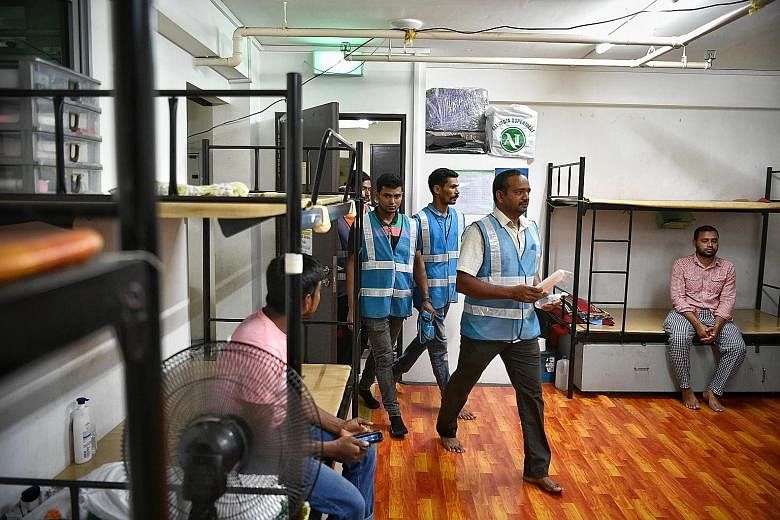Dormitory operators must put in place more measures to curb the spread of Covid-19.
These include preventing residents from visiting blocks they do not reside in, staggering timings for kitchen and shower use, and limiting the number of people in recreational rooms and minimarts.
The stricter rules were detailed in an advisory by the Ministry of Manpower (MOM) on Wednesday, even as it was announced later that night that a third dormitory, located in Sungei Kadut, had been identified as an active cluster.
The first two were the S11 dormitory in Seletar North Link and the Westlite Toh Guan dormitory in Jurong East. Last night, the Health Ministry announced new clusters at Mustafa Centre, a construction site and Keppel Shipyard.
The MOM advisory said the measures would take effect immediately until April 12.
Dorm operators would also need to monitor the health of residents in the affected blocks, restrict the movement of workers in these blocks and ensure safe distancing in common areas. This includes advising workers to stay in their rooms and minimise physical interactions.
In communal areas such as open spaces, entrances and canteens, workers are advised to maintain a 1m spacing between themselves, and not to share food.
Responding to queries yesterday, a spokesman for housing operator Centurion Corporation, which manages the Westlite Toh Guan dorm, said it had already enforced such measures to ensure the safety of its more than 6,600 residents, and would be monitoring and managing the situation.
Since its first confirmed case was announced on Monday, the operator has also ensured that all contacts linked to the cases have been isolated, including workers living in the same unit or working for the same employers. Deep cleaning and disinfection will also be done in the affected block and other high-traffic common areas.
MOM has been reaching out to the migrant worker community by working with groups such as the Migrant Workers' Centre to disseminate information and dispel rumours on the ground.
-
Foreign worker dormitories, construction sites
-
• Foreign workers living in dormitories are at risk of spreading infection as they live in close quarters in large numbers, use communal toilets and may not upkeep high standards of infection control practices, said infectious disease expert Leong Hoe Nam.
• The clusters involving three dormitories and a construction site with a total of 30 infected are: S11 dormitory in Seletar North Link, with 13 cases; Westlite Toh Guan dormitory in Jurong East with 10 cases; Sungei Kadut dormitory with two cases; and a construction site at Maxwell MRT station with five cases.
• Singapore has a total of 43 foreign worker dormitories licensed in accordance with the Foreign Employee Dormitories Act, based on a list on the Ministry of Manpower's website.
Clara Chong
Given the number of people in dorms, it is not surprising that Covid-19 clusters would result, said Mr Alex Au, vice-president of non-governmental organisation Transient Workers Count Too (TWC2). "There are also bad conditions like overcrowding and poor ventilation that increase the risk of infection."
TWC2 had raised this issue in a Straits Times forum letter on March 23 - just days before the first dorm cluster was identified.
Mr Au said: "When you have a foreign worker population that's more than one million strong, it can be a major source of transmission if we forget about them."
Telecommuting is not an option for these workers, and it can be a challenge to implement social distancing measures or self-isolation.
Mr Au suggested setting aside areas such as army barracks or open land for temporary tent lodging.
"Dorm operators cannot just space the beds out or build new floors... It's a bigger issue and that's where the Government will need to step in," he said.

